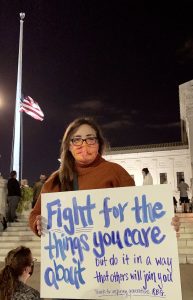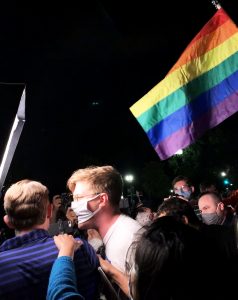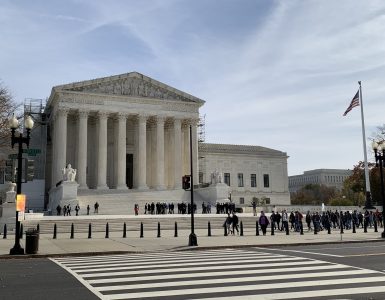A large crowd gathered at the Supreme Court’s steps on Friday night to mourn the passing of Supreme Court Justice Ruth Bader Ginsburg.

Ginsburg died on Friday night from complications due to metastatic pancreatic cancer. She was 87.
“I’m heartbroken that we lost her,” said Nina Oeberg, a health policy intern at the Health and Medicine Counsel of Washington. “I’m heartbroken that America lost her.”
Ali Bavin, a third-year student at Georgetown Law, called the news horrifying. “I got the news alert and my knees buckled,” she told The Wash.

Long-time Washington resident, Amanda Makulec, had a similar reaction.
“This is the event I feared the most,” Makulec said. “RBG was the best of them.”
Ginsburg was appointed to the Supreme Court in August 1993 by former President Bill Clinton. She was the second woman appointed by the Supreme Court and the longest-serving female justice.

A bastion of gender equality, Ginsburg gave dissenting opinions that advanced the rights of women.
“I think before we ever talked about breaking glass ceilings and shattering glass ceilings, she was finding her own way to take a stand there,” Makulec said. “[Ginsburg] set a tone that said that women matter in ways that weren’t valued when she went to school.”
Oeberg, who is also a political science major at Flagler College, called Ginsburg her role model.
“She paved the way for so many women,” Oeberg said. “She made policies that protect us.”
Bavin agreed. “She paved the way for women like me to go to law school.”
Washington law student Diala Alqadi said she admired Ginsburg for her pioneering role in the women’s rights movement and the greater fight for civil liberties.

The Karow family agreed, calling her life an act of service.
“Her life was a living demonstration of committing yourself to something larger than yourself,” Jay Karow said. “The level of her patriotism in coming back time and again to the Supreme Court and the work that she loved was a personal commitment to seeing the best for the country and always wanting to do the best for the country.”
Jay Karow and his wife, Linda Karow, were visiting the district when they heard the news.
Linda and Abigail Karow both expressed admiration for the late justice.
“She was a very dynamic woman,” Linda Karow said. “I really admired her for that.”

“She was just so strong,” Abigail Karow said. “She was there. She always came back. She didn’t let a battle with cancer stop her.”
Throughout the night, mourners expressed concern about what Ginsburg’s death meant for the Supreme Court’s future.
On Friday night, Senator Mitch McConnell announced that he would hold a Senate vote to fill the vacancy left by Ginsburg with President Trump’s nominee.
Early Saturday morning, Trump tweeted that he would nominate a Supreme Court justice “without delay.”
.@GOP We were put in this position of power and importance to make decisions for the people who so proudly elected us, the most important of which has long been considered to be the selection of United States Supreme Court Justices. We have this obligation, without delay!
— Donald J. Trump (@realDonaldTrump) September 19, 2020
Oeberg said she felt anxious about that decision.
“I don’t think that the current presidential administration really cares for women,” Oeberg said. “We’re nervous about our rights.”
Bavin called the announcement disgusting.
“I’m very concerned about abortion rights,” said Bavin.
“There’s a lot at stake with any kind of appointment,” Makulec said.
Bavin agreed, saying so much hangs in the balance.

During the gathering, right-wing activist and conspiracy theorist Jacob Wohl showed up with a microphone saying, “We’re going to get rid of Roe v Wade.”
A Senate floor showdown
Currently, the Supreme Court has a 5-4 majority of Republican-appointed justices. If the Senate moves forward with Trump’s nominee, the Supreme Court could have a 6-3 conservative-leaning majority, further shifting ideologies on landmark issues like reproductive rights, healthcare and immigration.
“The impact will be felt for decades to come because the change of the make-up of the Supreme Court would last for a long time,” Abigail Karow said.

“Being young, being in my 20s, the Court is going to shape the rest of my life,” Bavin said. “He’s appointing young justices to be on there. This is a generational issue.”















Add comment